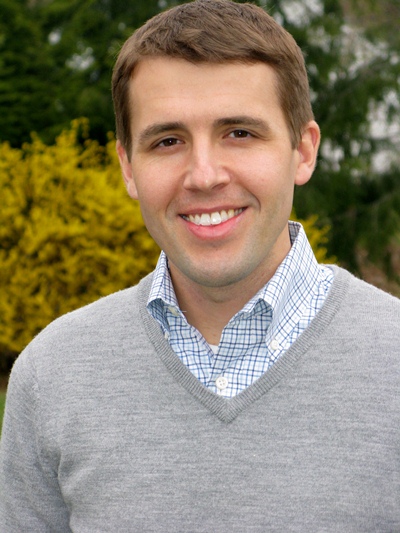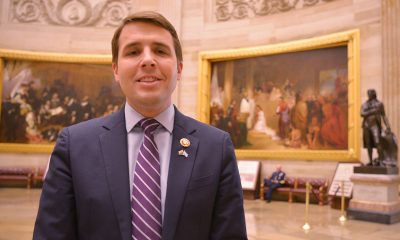News
Gay N.H. Executive Council candidate stumps in D.C.
Chris Pappas said sexual orientation “not an issue”

The Victory Fund on Friday hosted a fundraiser for gay New Hampshire Executive Council candidate Chris Pappas at the Beacon Bar and Grill’s Sky Lounge in D.C.
Gay New Hampshire Democratic Party Chair Ray Buckley was among the roughly 50 people who attended; while U.S. Sen. Jeanne Shaheen (D-N.H.,) former Human Rights Campaign President Joe Solmonese and Maryland Del. Heather Mizeur (D-Montgomery County) are among those who co-hosted the gathering.
“It was a nice group and a successful event,” said Pappas.
Pappas, who co-owns a popular Manchester restaurant that his family opened nearly a century ago, was a state representative before he served two terms as Hillsborough County treasurer. He declared his candidacy for the five-member gubernatorial advisory and oversight body in March after former Manchester Mayor Ray Wieczorek announced he would not seek another term. Pappas, 31, will face either current Hillsborough County Treasurer Robert Burns, state Sen. Tom DeBlois or local business owner Chuck Rolecek in November.
He told the Blade that he decided to run in response to the Republican Party’s near sweep of statewide offices in 2010. Pappas specifically pointed to the GOP-controlled Executive Council’s decisions to defund the state’s Planned Parenthood clinics and block a federal grant that would have funded a study into the proposed expansion of a commuter rail line from Boston into southern New Hampshire as two issues that specifically influenced his decision.
“The Executive Council has real power over the decision making process and the purse strings of our state,” he noted. “I think they’ve been using that to real extreme political ends.”
“It was years in the making of folks who had worked on the ground here building a coalition of not just Democrats and progressives, but Republicans and Libertarians as well,” he said. “That proved a successful strategy in the Legislature this year.”
Governor John Lynch, who announced last September that he would not seek a fifth term, signed the state’s same-sex marriage law in 2009. The two leading Republican gubernatorial candidates — Kevin Smith and Ovide Lamontagne — have said they would sign a same-sex marriage repeal bill if elected.
“We want to elect people who are advocates and [who are] going [to] work for us on this issue,” said Pappas. “It could come to a head again this year if we don’t elect the right governor.”
Pappas has hired a full-time campaign manager and opened an office in Manchester since officially declaring his candidacy. He said his sexual orientation is “not an issue” among potential voters, but conceded that he will need to raise hundreds of thousands of dollars to remain a competitive candidate going into November.
“We have a tactical advantage, but that can be easily outweighed with the amount of money that’s going to be put into television ads and the amount of money that’s going to come from these national right wing super PACS,” said Pappas, referring to New Hampshire’s status as a swing state in this year’s presidential election. He added he remains confident that voters will “see through efforts” from the Koch brothers and Karl Rove to “influence our elections with secret corporate money.”
“All the television ads in the world won’t outweigh the impact of neighbors talking to neighbors about the issues and values that matters to working families,” added his campaign in a follow-up e-mail to the Blade. “That’s what our grassroots team is already doing.”
In spite of these concerns, those who attended Pappas’ D.C. fundraiser were quick to praise him.
“Chris is a rising political star who’s already deeply experienced and knowledgeable about state government,” said Victory Fund CEO Chuck Wolfe. “If he wins this race he’ll be one of the state’s highest-ranking openly LGBT officials, but more importantly he’ll be in a position to serve all the people of New Hampshire. We’re proud to endorse him.”
Buckley, a former New Hampshire state representative from Manchester, agreed.
“Chris has the ability to bring people together and solve problems,” he added. “He has a bright future.”
District of Columbia
Reenactment of 1965 gay rights protest at White House set for April 17
Event to mark 60th anniversary of historic picketing

D.C.’s Rainbow History Project is inviting members of the local LGBTQ community and its supporters to participate in a reenactment of what it calls the historic 1965 first gay rights protest outside the White House.
The event is scheduled to begin at 4 p.m. Thursday, April 17 on the sidewalk in front of the White House.
In a statement, Rainbow History Project says the 1965 protest was organized by local gay rights pioneers Frank Kameny and Lilli Vincenz on behalf of the Mattachine Society of Washington, one of D.C.’s first gay rights groups that Kameny co-founded in the early 1960s.
“Led by Dr. Kameny and Dr. Vincenz, picketers demanded action on the Mattachine Society’s four major issues: the exclusion of homosexuals from Federal employment; the punitive policies of the U.S. Military; blanket denial of security clearances to gay people; and government refusal to meet with the LGBTQ community,” the statement says.
The statement referred to the titles of Kameny and Vincenz in connection with their academic doctorate degrees
“Although Dr. Kameny died in 2011, and Dr. Vincenz in 2023, Rainbow History Project and its all-volunteer corps will picket in their honor and demonstrate there is a new generation of young activists ready to take up their signs and their fight for equal rights for all LGBTQ people,” the statement says.
Among those expected to participate in the April 17 White House reenactment picketing is longtime D.C. LGBTQ rights advocate Paul Kuntzler, who is the last known survivor of the 1965 White House gay rights protest. Kuntzler was expected to carry a picket sign similar to the one he carried in 1965.
In its research on the 1965 gay White House protest, Rainbow History Project learned of a letter that Kameny sent to then President Lyndon B. Johnson outlining the demands of the White House protesters.
“We ask, Mr. President, for what all American citizens – singly and collectively – have the right to ask,” the Kameny letter states. “That our problems be given fair, unbiased consideration…consideration in which we, ourselves, are allowed to participate actively and are invited to do so.”
The RHP statement says the group “will carry replicas of the original protest signs and hand out literature explaining the picket to passersby and tourists.”
Myanmar
LGBTQ advocacy group joins Myanmar earthquake relief effort
March 28 quake killed thousands, devastated country’s second-largest city

A powerful earthquake that rocked Myanmar on March 28 unleashed devastation across the central part of the country.
The U.S. Geological Survey measured the quake at 7.7, and pinpointing its epicenter roughly 10 miles west of Mandalay, the country’s second-largest city. A 6.4-magnitude aftershock jolted the area 12 minutes later, compounding the destruction and deepening the crisis for a nation already strained by conflict.
The earthquake struck with terrifying intensity near its epicenter, wreaking havoc on Mandalay and the nearby city of Sagaing.
Mandalay, a bustling city of approximately 1.5 million residents, bore the brunt of the destruction. Among the most striking losses was the 12-story Sky Villa Condominium, which collapsed, leaving scores trapped beneath the wreckage. Rescue workers scrambled to pull survivors from the rubble, but the rising death toll underscored the tragedy’s magnitude.
In Sagaing, which is located closer to the epicenter, more than 70 percent of buildings sustained damage. The Ava Bridge, an essential artery spanning the Irrawaddy River, collapsed, cutting off a critical connection to Mandalay. The earthquake’s shallow depth of less than seven miles amplified its power, reducing homes, temples, and schools to rubble.
The earthquake’s death toll continues to climb, with at least 3,649 confirmed dead, more than 5,000 injured, and approximately 145 people missing. Amid the widespread devastation, questions loom about the impact on vulnerable populations. The Washington Blade reached out to Colors Rainbow, an organization advocating for LGBTQ rights in Myanmar, to understand how the crisis has affected one of the nation’s most marginalized communities.
Colors Rainbow Executive Director Hla Myat Tun spoke about how his organization is working to address the crisis faced by Myanmar’s LGBTQ community in the aftermath of the earthquake.
Colors Rainbow has implemented a system of multipurpose cash transfers, directing funds to local LGBTQ partner organizations. These grassroots partners, in turn, provide essential support to affected individuals that includes emergency cash assistance, food, non-food items, clean water, and basic emotional support tailored to the immediate needs of their communities.
“We estimate that around 500–800 LGBTQ individuals have been impacted in the affected areas, particularly in Mandalay Region, Sagaing Region, and southern Shan state,” said Hla Myat Tun. “So far, we have been able to directly assist around 80–100 LGBTQ individuals.”
Hla Myat Tun told the Blade that Colors Rainbow is actively gathering data to assess the specific challenges that LGBTQ people are facing in the aftermath of the earthquake.
Preliminary observations, he noted, point to heightened vulnerability among LGBTQ people, driven by social exclusion and limited access to mainstream humanitarian aid. Hla Myat Tun, however, emphasized more comprehensive information is necessary to fully understand the scope of their needs and vulnerabilities in this crisis.
“We are partnering with international LGBTQ and feminist organizations that focus on displaced communities,” said Hla Myat Tun. “These partners provide emergency funds, and we coordinate with local LGBTQ groups to deliver aid directly to affected individuals on the ground.”
Addressing reports of military restrictions on humanitarian aid, Hla Myat Tun explained how Colors Rainbow is managing to reach LGBTQ people who are in conflict zones and areas the military junta controls. Hla Myat Tun highlighted the importance of the organization’s trusted local LGBTQ partners, who are embedded in these regions. Their presence and established networks, he said, are vital in navigating restricted areas and ensuring that aid reaches the LGBTQ people who are most in need.
Hla Myat Tun also provided insight into how Colors Rainbow is tailoring its relief efforts to meet the LGBTQ community’s specific needs.
He said his organization is gathering information directly from LGBTQ people through close coordination with its local partners, relying on both formal and informal communication channels. Hla Myat Tun told the Blade his team conducts daily check-ins via quick telephone calls, ensuring a continuous flow of information to guide their response efforts despite limited internet access, electricity and other challenges.
“Our approach is collaborative — we set strategies and share responsibilities to respond flexibly and safely, based on the rapidly changing local context,” he said. “Personal stories are being documented, but for security reasons, we are cautious about sharing them publicly.”
When asked whether staff or volunteers had harassment, discrimination, or violence while delivering aid — a concern given the precarious legal and social climate for LGBTQ people in Myanmar — Hla Myat Tun said there have been no reported incidents thus far.
“So far, we haven’t received any reports from our staff or local partners about harassment or violence while delivering aid,” he noted, emphasizing Colors Rainbow remains vigilant and has implemented robust safety protocols to protect all involved.
Colors Rainbow relies primarily on funding from international LGBTQ-focused partners. He noted, however, humanitarian funding specifically dedicated to LGBTQ communities remains vastly under-resourced, relative to the pressing needs on the ground. Hla Myat Tun said this shortfall severely limits the scale and reach of Colors Rainbow’s efforts.
“While Myanmar’s legal framework remains outdated, societal attitudes — especially during the civilian government — have shown signs of progress,” said Hla Myat Tun. “We have seen positive change thanks to the work of local LGBTQ organizations.”
“In the current crisis, many communities are working together despite legal barriers. However, in areas without LGBTQ-led organizations, inclusive humanitarian responses are still lacking,” he added. “There’s an urgent need for international humanitarian actors to understand and implement LGBTQ-inclusive practices in Myanmar.”
When asked about long-term strategies to support the recovery and resilience of LGBTQ communities as Myanmar rebuilds, Hla Myat Tun affirmed Colors Rainbow is deeply committed to fostering resilience. The organization’s initiatives include leadership development, community empowerment through training and workshops, sub-granting programs, and organizational development support. He also highlighted Colors Rainbow’s advocacy for LGBTQ-inclusive policies and collaboration with ethnic groups to promote an inclusive federal democracy, and specifically thanked Outright International, a global LGBTQ and intersex rights group, for “amplifying our work.
“This kind of international attention shines a spotlight on the challenges LGBTQ communities in Myanmar are facing and helps open doors for more support,” Hla Myat Tun told the Blade. “It also boosts visibility and solidarity, both locally and globally, which we deeply appreciate.”
Hungary
Hungarian MPs amend constitution to ban public LGBTQ events
Viktor Orbán’s government spearheaded amendment

Hungarian MPs on Monday voted to amend their country’s constitution to ban public LGBTQ events.
The vote took place less than a month after lawmakers banned Pride events and gave authorities the green light to use facial recognition technology to identify those who participate in them.
The Associated Press notes MPs approved the constitutional amendment — which Prime Minister Viktor Orbán’s Fidesz-KDNP coalition government proposed — by a 140-21 vote margin. Authorities before the vote removed a group of protesters who tried to block the entrance to a parliament parking garage.
Orbán’s government over the last decade has moved to curtail LGBTQ and intersex rights in Hungary.
A law that bans legal recognition of transgender and intersex people took effect in 2020. Hungarian MPs that year also effectively banned same-sex couples from adopting children and defined marriage in the constitution as between a man and a woman.
An anti-LGBTQ propaganda law took effect in 2021. The European Commission sued Hungary, which is a member of the European Union, over it.
MPs in 2023 approved the “snitch on your gay neighbor” bill that would have allowed Hungarians to anonymously report same-sex couples who are raising children. The Budapest Metropolitan Government Office in 2023 fined Lira Konyv, the country’s second-largest bookstore chain, 12 million forints ($33,115.76), for selling copies of British author Alice Oseman’s “Heartstopper.”
Former U.S. Ambassador to Hungary David Pressman, who is gay, participated in the Budapest Pride march in 2024 and 2023. Pressman was also a vocal critic of Hungary’s anti-LGBTQ crackdown.
The Washington Blade has reached out to Budapest Pride for comment on the constitutional amendment.
-

 District of Columbia5 days ago
District of Columbia5 days agoWorldPride organizers may warn trans people from abroad not to attend event
-

 Opinions4 days ago
Opinions4 days agoIt’s time for new leadership on the Maryland LGBTQIA+ Commission
-

 The White House4 days ago
The White House4 days agoWhite House does not ‘respond’ to reporters’ requests with pronouns included
-

 Noticias en Español4 days ago
Noticias en Español4 days agoINDIGNACIÓN: ¡El transfeminicidio de Sara Millerey en Colombia nos cuestiona como sociedad!













